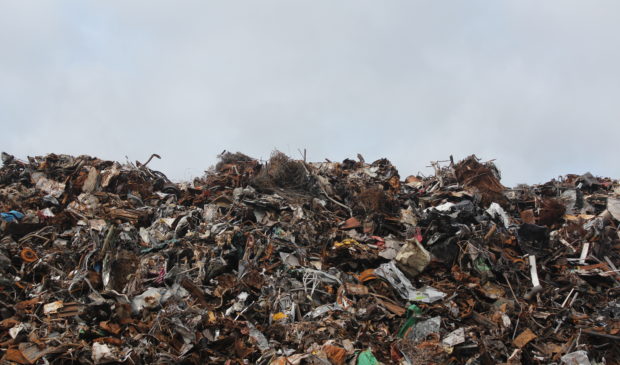Alter: Council is letting garbage company rewrite lobbying rules
Wednesday, November 8, 2017 by
Jack Craver City Council Member Alison Alter said Tuesday that her colleagues were allowing one company to rewrite city lobbying rules, suggesting that an ongoing rewrite of the Anti-Lobbying Ordinance was largely the result of bullying by Texas Disposal Systems, a waste hauler that has accused city lobbying regulations of infringing on its First Amendment rights.
Alter’s comments came after city staff recommended delaying adoption of a new lobbying ordinance by another six months, and a number of Council members said they were against a measure she proposed that would subject an upcoming contract for biosolids disposal to certain lobbying restrictions.
Since April, waste contracts have been exempt from the city’s Anti-Lobbying Ordinance while city staff and various commissions have worked on drafting a new ordinance. Council voted for what was intended to be a temporary exemption in response to objections raised to the ordinance by TDS.
TDS, which has a number of large, long-term waste contracts with the city, has claimed that the ALO effectively prevents it from bidding on other contracts. It has cited a rule in the ordinance that prohibits company representatives from communicating with city officials about the contract while bids are being solicited.
TDS claims that its regular contact with city staff relating to its existing contracts might put it at risk of violating that rule, therefore leaving it vulnerable to “debarment,” a provision of the ALO that has never been invoked but which allows the city to ban a company from doing business with the city for up to three years.
Although Council was scheduled to take up a proposed new ordinance on Thursday, the head of the city purchasing office on Tuesday recommended that it be postponed, saying staff has not yet had time to make sense of the feedback it has received from the Ethics Review Commission, which recently provided a recommendation for a new lobbying ordinance that differed slightly from an earlier recommendation made by city staff.
Even if Council were to approve a new ordinance immediately, however, it would be at least 30 days before it would take effect. That’s why, Alter argued, it was imperative for Council to quickly attach language to the biosolids contract requiring vendors to abide by rules that apply to most other city contracts, most notably a prohibition on contacting Council members or city staff about the contract while it is being solicited.
Other Council members signaled that they were fine allowing the biosolids contract to proceed without the typical lobbying restrictions as they wait for a new, permanent anti-lobbying ordinance to be crafted.
“Worst-case scenario, somebody calls up a Council member and tries to convince them to approve a contract,” said Council Member Delia Garza, who added that putting in place a measure specifically for one contract might distract from the ongoing process of writing a new ordinance.
Council Member Ann Kitchen similarly described Alter’s measure as “insulting” to the stakeholders involved in rewriting the ALO.
Council Member Leslie Pool, who has been leading the effort on the new ordinance, said that she didn’t want to support adding contract language that “hasn’t been vetted.”
Council Member Jimmy Flannigan was the only one to come to Alter’s defense.
“For me, this isn’t about whether my office can handle some extra phone calls (from lobbyists),” he said. “It’s about the money these companies will spend on lobbyists that will become embedded in the cost of these contracts.”
There was also no reason for anybody to believe that attaching language to a contract would in any way interfere with the separate effort to rewrite the ordinance, Flannigan said.
Alter, clearly frustrated by her colleagues, said that the process for crafting a new lobbying ordinance had “gone totally off the rails” as a result of bullying by TDS. The result has been unfair to the city as well as to the thousands of other vendors that have not raised objections about lobbying rules, she said.
“We have unleashed a process where we’re allowing one company to rewrite the Anti-Lobbying Ordinance, when it affects 40,000 companies,” she said.
Alter also dismissed the notion that Council would risk offending or alienating stakeholders by approving her measure. The only risk, she said, was that TDS will refuse to bid on the biosolids contract and would once again “try to bully Council” into changing the rules.
“It may be time that we call their bluff,” she added.
In a lengthy statement Tuesday evening, TDS said it was opposed to Alter’s measure and noted that the Zero Waste Advisory Commission and Waste Management Policy Working Group, which was assembled specifically to work on the ALO, both recommended that waste contracts remain exempt from the ALO until a long-term replacement is put in place.
That city staff had recommended a six-month postponement “is itself the very best evidence of the scope of serious concerns with the current ALO and the risk of voting to reapply it to waste solicitations,” said the company.
The Austin Monitor’s work is made possible by donations from the community. Though our reporting covers donors from time to time, we are careful to keep business and editorial efforts separate while maintaining transparency. A complete list of donors is available here, and our code of ethics is explained here.
You're a community leader
And we’re honored you look to us for serious, in-depth news. You know a strong community needs local and dedicated watchdog reporting. We’re here for you and that won’t change. Now will you take the powerful next step and support our nonprofit news organization?








